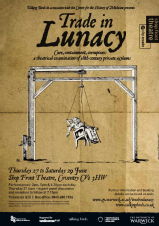Audience Comments
Please find below a selection of the comments and feedback we kindly received from members of the public who attended the Trade in Lunacy production (and panel event):
|
Number of comment cards completed = 91 Members of the public = 63 Not indicated = 11 |
‘How has this performance influenced your views on the treatment of mental illness and on mental health issues more broadly’
- Very relevant to today’s mental health system still. With diagnostic uncertainty and no clear research in terms of treatment the story remains the same. Unfortunately, so do the narratives of distress. I hope to see more performances like this as it raises awareness but most importantly it raises very important questions such has how do we alleviate distress?
- This performance has, more than anything else, amazed me with it’s humorously, sensitively and carefully researched transformation of what is in many ways a highly emotive subject. Before the performance I couldn’t imagining how the material I presumed would be used could be turned into a performance; after it
I’m very impressed by the ingenuity. -
Fabulous engaging performance followed by thought provoking panel. Many parallels brought to mind from the C18th to contemporary times – the suffering of patients and the struggles of those trying to understand and help them. Mental health issues have had a profound effect on the human condition through the ages - it is not a contemporary epidemic.
-
The performance has shown me how just how far it has come over time, the discoveries, improved methods and the changes since the times when drilling a hole in the head cured a headache. Without the evolution of those concoctions, medicine and therapy would not be as good as it is today. Good performance, great music, thank you.
- Certainly makes you consider the options that were afforded to patients of the past and what is at use in modern day institutions! Thought provoking and entertaining.This performance has, more than anything else, amazed me with it’s humorously, sensitively and carefully researched transformation of what is in many ways a highly emotive subject. Before the performance I couldn’t imagining how the material I presumed would be used could be turned into a performance; after it I’m very impressed by the ingenuity.
- After watching this performance I am fully aware of how patients were treated while being in an asylum. Mental issues are all extremely serious issue and patients should be helped accordingly.
- I did not realise that some private homes opened up as asylums and it is very interesting to consider this in regards to how mental illness was viewed by society.
-
It was very well performed, interesting and illuminating. One can only hope the mentally ill receive better treatment in modern times.
- Like many branches of science, things change but one must wonder whether or not today’s treatment with drugs and sedation is humans or just different to the practices of the 19th and early 20th centuries.
- More aware of historical methods of almost torture. Loved how the story was narrated through period song. Use of shadow worked well to show the almost brutal methods and allow one’s mind to imagine what was really going on behind closed doors.
- ‘Trade in Lunacy’ is a vivid portrayal of the state of mental health ‘treatment’ on the context of 18th century Britain. The class perspective, politics of gender and the inequalities that existed within both, have been portrayed well with respect to attitudes towards mental health.
- Very interesting and thought provoking piece – mental health issues and treatment are still a topic which needs more discussion and awareness – any piece of work that begins these conversations is important and especially that looks at the historical context.
- The performance was superb, the way the person supposed to cure, was the one who has ‘mad’ at the end, shows the possible ‘slide’ to mental illness. The script and songs were very well thought out and nice to see ‘local’ places used.
- It makes me realise the inequality in treatment between the rich and the past. The doctor/psychiatrist seemed to want so strongly to help and to ‘cure’ his patients however what does that even mean? By such draconian mentioned that don’t seem to have changed so much. The patients were used to experiment the possible ‘cures’ on, which I didn’t realise. A very thought provoking piece that makes me want to find out more – particularly the institutionalism of the poor.
-
Coming from a reasonably well informed position on the history of the treatment of mental illness, I think that this performance reflects the difficult nature of treating mental illness well. It was well done, tackling a difficult subject matter in thought provoking manner without being too inaccessible.
-
There is still so much more to do regarding the treatment of people with mental illness. This play confirms that.



